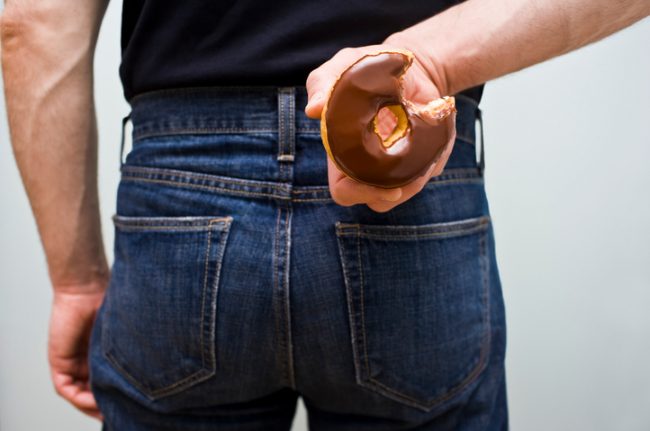Food choices come with a lot of judgment, cloaked and uncloaked. Are they eating processed food, or organic, or both?
The moralization of food choice, has its roots in the way we label foods good or bad. We do it to draw clear lines for ourselves, but it tends to spill over to other people. Moralizing your food choices creates a subtle, unconscious shift in your behavior. It becomes all too easy, justified even, to project moral attributes, and weakness, onto food choice.
Food shaming is fat shaming’s close cousin, rooted in the fat phobia that runs rampant in our culture. Food shaming has become insidious, sneaking into our daily interactions.
Here are five food shaming behaviors to watch out for, along with a quick fix for each.
The food analyst
Keeping up a running narrative on what other people are eating, and it’s relative merits, only serves to make to the shamer feel good about herself—and the shamed feel worse. If you are on the receiving end of biting remarks, forgive them for their lack of tact, and concentrate on enjoying your food choice.
Tip: Instead of snarky food jibes that produce guilt and shame, don’t discuss food choices unless asked.
The vegan superior
Getting up on the vegetarian high horse is a classic example of food shaming. Many people equate eating meat with a moral laxity that verges on depravity. (It may be worthwhile to point out that even the Dalai Lama eats meat.) Judging people for eating meat is a rookie move and sets the mood for polarization rather than informed discussion.
Tip: If you are prone to getting judgy around meat consumption, this would be a great time to curb your enthusiasm. People have their reasons for eating or not eating meat, and being sensitive, rather than condemnatory, is a far better approach.
The clean plate enthusiast
There are a lot of people who believe that food, once plated, should not be wasted. They frown on throwing away food, but the truth is it’s better to be in touch with eating how much your body wants than mechanically eating everything on your plate.
Tip: Lighten up about unfinished food. Instead of making someone feel bad about not finishing their food, congratulate them on how in tune they are with their bodies. And if it’s your child who is the target of your approbation, you can also kindly offer to save the leftovers for a snack for later.
The overt health champion
A more subtle form of food shaming is loudly praising good food choices, while withholding comment about more run of the mill options. For example, a friend mentioned that a certain elementary school teacher would actually go around the room and give kids loud “good jobs” for bringing healthy snacks. And if a snack wasn’t so healthy, she’d point out flaws, “hmm, that granola bar has chocolate chips in it, though.” My friend aptly summed it up as recipe for embarrassment and exclusion.
Tip: Call a food shamer out on their behavior. If someone makes a judgment, you can be direct and say, “Don’t food shame me!” or you can modulate it by saying, “this is what I choose to eat right now. It may not be what you would choose, but criticizing my choice publicly will not change my behavior.” Calling the person out may make them more conscious of their behavior and help nip their food-shaming penchant in the bud.
The scowler
Lots of fast foods and junk foods elicit dirty looks, which can energetically convey a disapproving attitude. Be aware that our facial expressions convey an enormous amount and have more of an effect on people than we realize. And a scowl may reflect a person’s own relationship to their own trigger foods as much as it is directed to your food choices.
Tip: Instead of scowling, try softening toward what irritates, upsets or disturbs you on that person’s plate. Find a place in your heart that can include Twinkies. Whatever emotion the food is triggering in you, lean in by allowing. Relax the muscles of your face and the intensity of your gaze. You can even play with finding a sense of humor about the situation.


